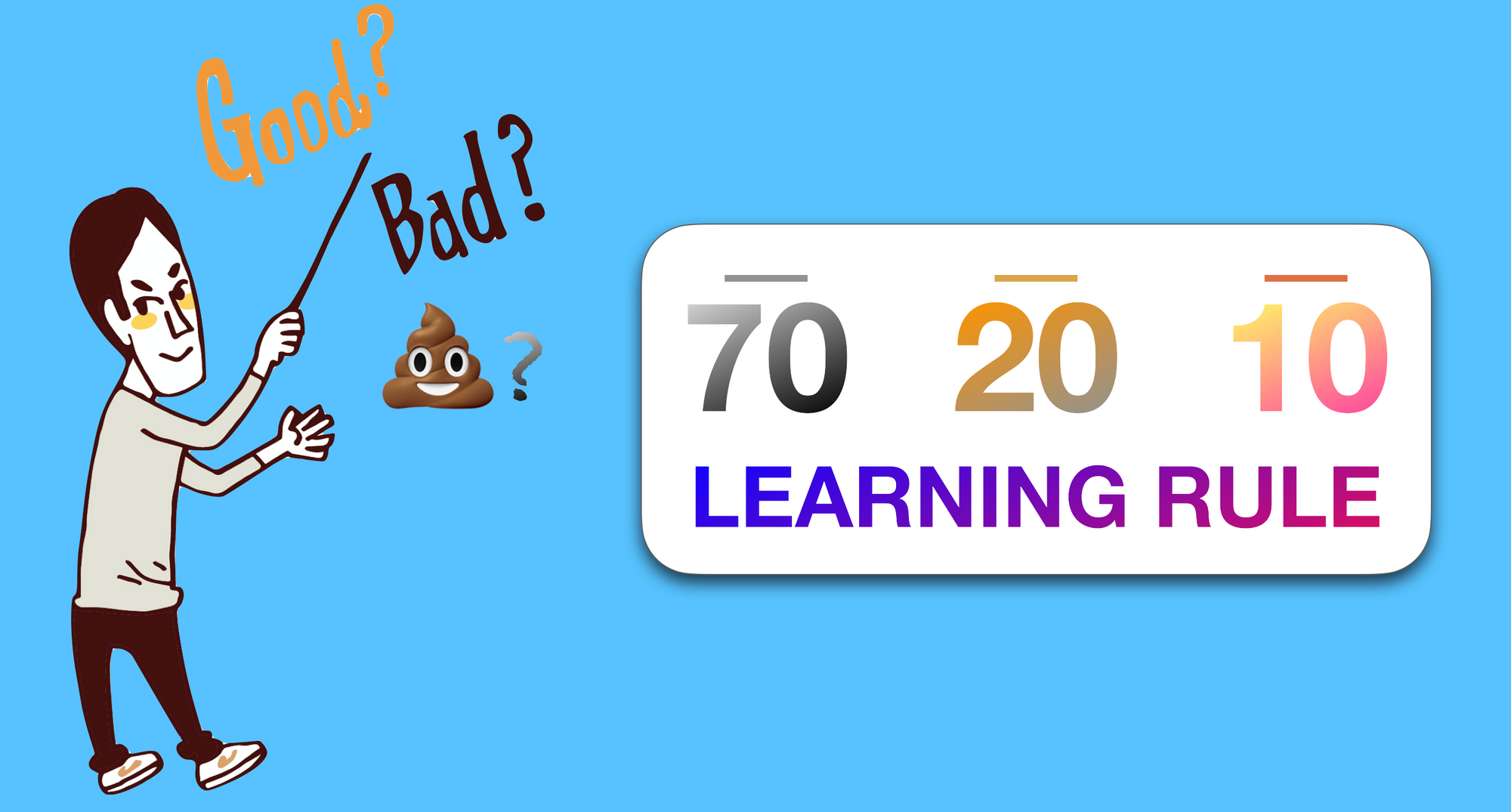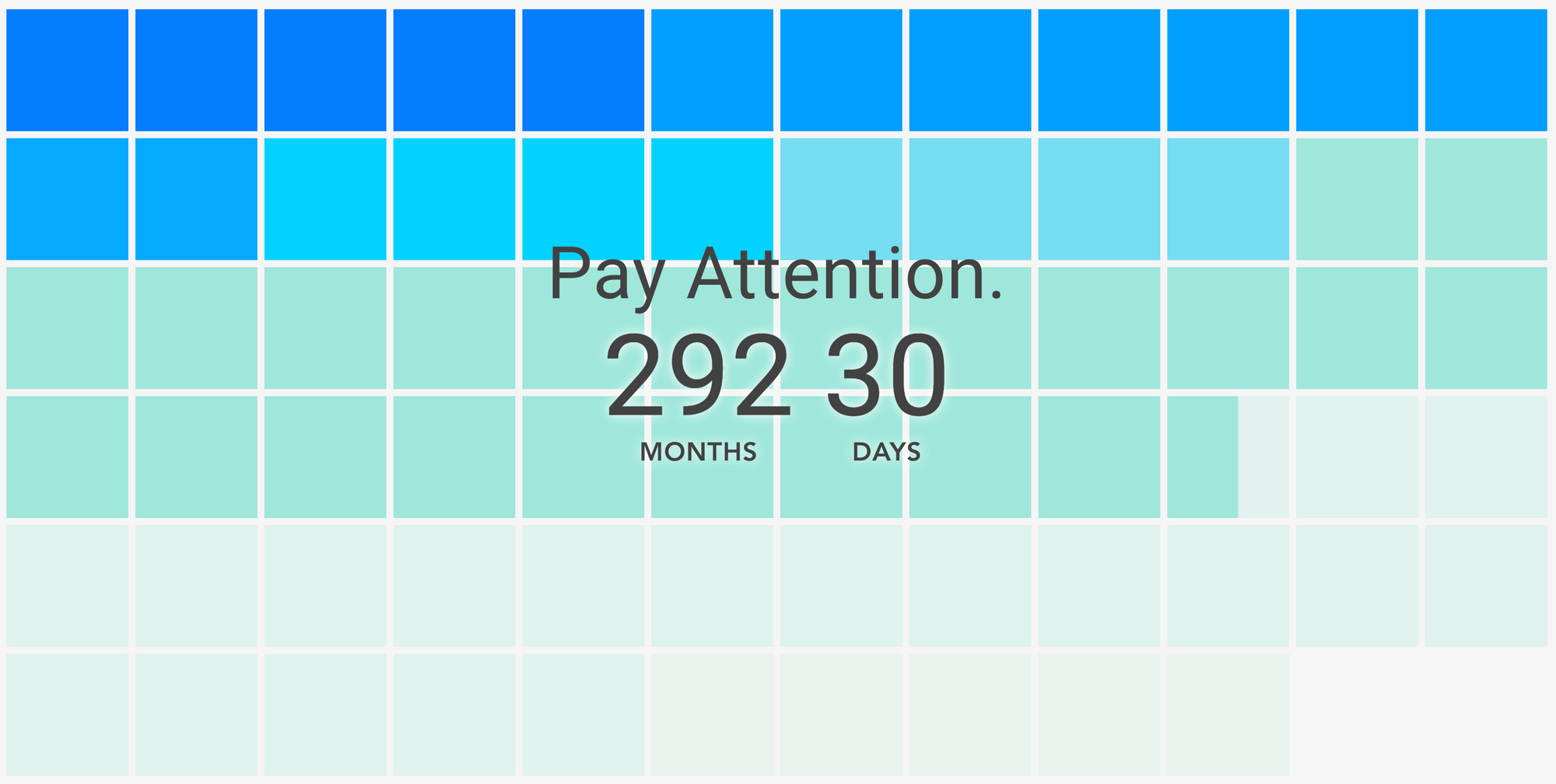Why You Should Trash the 70:20:10 Learning Rule
The 70:20:10 learning rule is poorly designed, and there is a better way to create a learning environment in your company.

I put up with the 70:20:10 rule for more than 10 years during my time at Nike and Apple. It is unscientific, wasteful, and should be banned for good.
But before we dive deeper into this topic, let me share with you 3 random and fun things:
- How much time do I have left in my life? I plotted it out on a chart, and it forever changed how I looked at my life.

2. NASA sent a spaceship to Jupiter and recorded a podcast with it. It sounded very, very evil.
3. 5 years ago, my wife and I decided to zero out our savings sooner and quicker. No, we didn't buy fast cars and seasoned cast iron cookware. Instead we built a non-profit school. I quitted my corporate job and turned a monthly salary into time for building my coaching practice. Two books triggered and fueled this shift in how I looked at career, time, and money:
Halftime: Moving from Success to Significance by Bob Buford
Die With Zero: Getting All You Can from Your Money and Your Life by Bill Perkins.
On Leading: Ditch the 70:20:10 Learning Rule

What Is the 70:20:10 Learning Rule?
The 70:20:10 rule states that "individuals tend to learn 70% of their knowledge from challenging experiences and assignments, 20% from developmental relationships, and 10% from coursework and training."
I was introduced to it at Nike back in the mid-2000s. Our HR manager shared the rule with us and used it to explain the type of learning and development support we should expect from the company. Apple also adopted this rule. Recently, one of my coaching clients shared that his company still uses this rule.
How Was The 70:20:10 Rule Developed?
It is based on a self reported survey conducted in 1996 asking nearly 200 executives on how they believed they learned.
Let's just pause for a second. Let's put on our "Statistics 101" hat and consider these 3 facts of this survey:
- The rule was the outcome of only 1 survey
- It was a self reported survey. Self reported surveys were prone to a host of biases
- The sample size was small and skewed: 200 already successful managers
🧐
Alright. Let's continue.
These 200 executives were asked the question “Please identify at least three key events in your career, things that made a difference in the way you manage now.
1) What happened?
2) What did you learn from it (for better or worse)?
Since then, there have been additional studies investigating the effectiveness of this rule. The findings were negative. They ranged from "lack of empirical data supporting 70:20:10" to "it is not a scientific fact" to "not a recipe for how best to develop people."
Why You Should Stop Using This Rule?
The poor integrity of the survey alone should be enough for any decent HR professionals to trash this rule. But for the sake of this article, let's put aside the flaws of the study and investigate the merits of the rule.
The assumption that a ratio of 70:20:10 would fit all learning needs simply cannot be correct because we all learn differently. For example, I tend to catch up much faster if I am allowed to take the time to read about the topic first, while my brother learns much more effectively if he is allowed to experiment and experience from the get-go. Different roles and circumstances demand us to learn in different ways too- A new manager and a tenured director need to learn different things.
The rule depends too heavily on the learner. It expects 70% of the knowledge to come from employees learn from "on the job" experiences by themselves. Success depends heavily on the learners' ability to self-learn, self-persevere, and self-reflect.
If you are like me, my ability to self-anything is dreadful. When leave to our own devices, we are prone to self sabotaging behaviours. We procrastinate, doomscroll on Instagram, instead of clicking the "Start" button on the online class webpage. We need personal trainers because we cannot rely on our own willpower (and Fitbit devices) to lose weight. It is unwise to count on a learning model that banks on us being as regimented as that morning rountine Jedi Master who finishes a half marathon every day before 5:32am.
This rule may work for high functioning self-driven superstars. But if your team is star-studded, they would be landing rockets on Mars and eliminating world hunger already. They wouldn't need any additional learning rules or models to kick arse. Yet for most Earth-bound companies, we need learning methods that actually nudge and propel us mortals to max out our potential.
An Alternative Learning Model: The Learning Dials Model™
One thing the 70:20:10 rule got right was identifying the 3 fundamentals of learning: doing, learning, and coaching. What it got wrong was the percentages. We need a system that leverages these 3 fundamentals of learning dynamically. Instead of ratios or percentages, we should think of the doing, learning, and coaching as knobs or dials that we can turn up and down according to the individual teammate's learning styles, the skills they are learning, and the circumstances they are in.
We managers should be the one turning and tinkering with these dials with our team members- Should we turn the up "doing knob" and give them more stretch projects, or should we turn up the "learning knob" and let the team member study more material? Should we turn the "coaching" dial towards more instructions, or should we guide them to reflect more inwardly?
We managers need to be observant and inquisitive. What evolved behaviours are we noticing? What is helping them excel? How are they stalling? How can we help them understand and talk about their learning journey more coherently?
If this is confusing, here is an image I have created for myself. Whenever I am deploying the Learning Dial Model, I imagine myself constantly toggling these knobs, in order to create the most personalized learning experience for them..

You can support me:
Reply to this and chat with me! Tell me what you think of this. Or whatever is on your mind. I will always reply, I guarantee it.
And if I fail to keep my promise? Email me and let me know at siu.david@hey.com 🙃
Share this with someone whom you think wants to sound smarter, and or anyone who deserves something light and fun. (Plus, they trust your recommendations more than my LinkedIn ads.)
Thank you for reading this. I think about leadership & psychology in the showers. I know it's odd, but these topics are important and fun. I hope you find them useful too.
Work diligently. You are bound to be successful.
David
